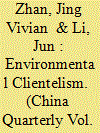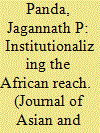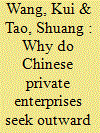|
|
|
Sort Order |
|
|
|
Items / Page
|
|
|
|
|
|
|
| Srl | Item |
| 1 |
ID:
187811


|
|
|
|
|
| Summary/Abstract |
This study examines the causal effects of having a Chinese Communist Party (CCP) branch on the coverage of labour contracts and social insurance among employees in private enterprises. Using a regression discontinuity design in a quasi-experimental framework, we find that having a Party branch has a significant effect on the coverage rates of individual and collective labour contracts as well as five social insurance schemes. The positive effect of having a Party branch on contract and social insurance coverage are weaker when the enterprise also has a trade union and staff representative congress, when the entrepreneur is a member of the CCP or the People's Congress or Political Consultative Conference and in provinces in which government intervention is lower or the private sector more developed. We find that firm-level mean wages and spending on training and occupational health and safety mediate the relationship between having a Party branch and labour rights.
|
|
|
|
|
|
|
|
|
|
|
|
|
|
|
|
| 2 |
ID:
192627


|
|
|
|
|
| Summary/Abstract |
China's environmental crackdowns under Xi Jinping have led to a sweeping shutdown of private enterprises. To circumvent this, enterprises have developed different survival strategies including direct lobbying to government officials and indirect lobbying through business associations. Based on comparative case studies of environmental lobbying in Chinese cities, our research finds that larger enterprises, enjoying more economic leverage, tend to lobby directly using their own political connections to sway environmental enforcement. By contrast, smaller enterprises are excluded from these clientelist networks and have to lobby through business associations, the effectiveness of which hinges on the support of large enterprises. Therefore, we argue that although the Chinese government's increasingly stringent environmental policies have shrunk the lobbying (and living) space for private enterprises, the existence of environmental clientelism protects economically powerful and politically connected private enterprises but sacrifices the others in the implementation of environmental policies.
|
|
|
|
|
|
|
|
|
|
|
|
|
|
|
|
| 3 |
ID:
028436


|
|
|
|
|
| Publication |
New Delhi, Economic and Scientific Research Foundation, 1968.
|
| Description |
69p.
|
|
|
|
|
|
|
|
|
|
|
|
Copies: C:1/I:0,R:0,Q:0
Circulation
| Accession# | Call# | Current Location | Status | Policy | Location |
| 001404 | 338.61/ECO 001404 | Main | Withdrawn | General | |
|
|
|
|
| 4 |
ID:
179165


|
|
|
|
|
| Summary/Abstract |
In a context of increased state expectations that Chinese private enterprise will “give back to society,” this article argues that the way that locally developed private enterprises engage in welfare and poverty relief in rural China is decisively shaped by the social networks of the owners. Three very different industrial structures located near to each other in Fanhua County, Shandong Province, are compared. These are: a small group of large conglomerates situated near the county seat, a networked cluster of over 3,000 mostly small and micro furniture companies, and a cluster of midsize companies that produce sheet steel. Industrial structures have shaped the owners’ social networks in each of these three industries. The norms embedded in the businesspeople’s social/business networks, which are affected by the influence on the networks of political authority, factory-owner peers, and ordinary locals, orient the private enterprise owners toward providing or not providing social welfare in particular ways.
|
|
|
|
|
|
|
|
|
|
|
|
|
|
|
|
| 5 |
ID:
155171


|
|
|
|
|
| Summary/Abstract |
China and India have for quite some time been participants in African politics and have employed persuasive strategies to make their presence felt in that continent. The main objective of their current participation and presence in Africa is to exploit energy resources and establish greater political connections there. The Chinese strategy is to be generous with loans and financial aid; the Indian strategy has been to employ populist and democratic measures, highlighting its historical and cultural connections with Africa. Pursuing stronger bilateral relations with African countries has been the principal medium of their continental reach. But bilateral bonding has been taking a backseat recently in their approach vis-à-vis multilateral relations, for which institutional and organisational bonding is being used as the prime medium. South Africa is a conspicuous illustration of this approach. Both China and India share strong bilateral ties with South Africa, which is the frontier state for their outreach to Africa. Their engagements with that country through multilateral forums like the AU, BRICS, BASIC and IBSA exhibit how multilateralism is becoming for them a leading approach relative to bilateralism. Their objective, besides enriching and influencing their bilateral understanding with that country, is to achieve their global ambitions and objectives in tandem with the African continent on a whole. This paper examines the instrumental approach that the two countries employ towards Africa where multilateralism is becoming a prime channel of contact over bilateralism. To what extent this approach has advanced their strategic interests in Africa commercially and politically also needs analysis.
|
|
|
|
|
|
|
|
|
|
|
|
|
|
|
|
| 6 |
ID:
159075


|
|
|
|
|
| Summary/Abstract |
This paper contributes to the systematic understanding of Chinese investment abroad, and particularly the role of state-owned enterprise (SOE) investors, in two ways. Firstly, we identify major problems in the literature stemming from wide-spread data deficiencies in data. Specifically, the reliability of previous research results has been limited by data sets that do not identify the final destination for Chinese investment, nor suitably differentiate between different ownership types. By augmenting the project-level data from the China Global Investment Tracker with detailed ownership information for each firm, this study reveals that large-scale investment in natural resource investment, which surged after 2008, is dominated by state-owned enterprises controlled by China's central government. But it also reveals a newer wave of non-resource investment after 2009 in which non-state enterprise plays the leading role.
|
|
|
|
|
|
|
|
|
|
|
|
|
|
|
|
| 7 |
ID:
175060


|
|
|
|
|
| Summary/Abstract |
This study examines state-private firm coordination in China’s corporate globalization with a focus on cross-border mergers and acquisitions in Southeast Asia. The profile of China’s private firms in the country’s overseas economic expansion has risen dramatically over the past few years, but the controversy continues as to what extent they coordinate their overseas activities with the state. This is because Chinese private firms, not unlike state-owned enterprises, have political economy reasons to subject their corporate decision-making to state preferences. Still, the outcomes of state-firm coordination in private sector internationalization vary. In some transactions, the state and private firms form a strong partnership through elaborate policies and financing; others see some alignment that is not decisive for transaction outcomes; and still others see minimal, almost rhetorical engagement. The varied outcomes can be explained by the combination of foreign direct investment (FDI) motives and the technology intensity of the target industry. We propose a framework drawn from the international business theory of FDI motives and the literature on China’s techno-industrial policy to classify different types of state-private sector coordination. We survey recent developments in China’s cross-border acquisitions in Southeast Asia and provide illustrative case studies to support our argument.
|
|
|
|
|
|
|
|
|
|
|
|
|
|
|
|
| 8 |
ID:
093851


|
|
|
| 9 |
ID:
137598


|
|
|
|
|
| Summary/Abstract |
After more than three decades of rapid growth, China's economy is going through an important turning point, where structural imbalances in both supply and demand sides must be addressed for a more moderate and sustainable growth path. By focusing on the structural changes to its ownership, a central element in China's economic transformation under market reform, the present paper highlights the importance of private entrepreneurship in deepening market reform and, thereby, in driving economic growth in a more efficient and sustainable way. Based on a perspective of resource allocation and a conceptual framework of entrepreneurship, the paper elaborates on the evolution of the private sector and its performance in the context of ownership reform, making comparisons with the performance of the state sector. The analysis suggests that there is further room for more productive use of economic resources, especially capital, land and natural resources, by increasing the participation of private entrepreneurs in industries with high entry barriers in favor of state-owned enterprises. Moreover, more competitive and equal access to productive resources through reform is needed to promote more productive entrepreneurship and to reduce rent-seeking activities.
|
|
|
|
|
|
|
|
|
|
|
|
|
|
|
|
| 10 |
ID:
155172


|
|
|
|
|
| Summary/Abstract |
China has been engaged with Africa since the 1956. Following the domestic economic reforms of 1978, politically and ideologically motivated engagement gave way to economically and commercially driven cooperation. Successive waves of reforms in China have made the engagement more economically and commercially driven. Initially China’s engagement with Africa in general was dominated by China’s state-owned enterprises. More recently private enterprises have entered the arena.
|
|
|
|
|
|
|
|
|
|
|
|
|
|
|
|
| 11 |
ID:
193005


|
|
|
|
|
| Summary/Abstract |
China is currently in a period of economic transformation and the reform of the factor market still lags behind that of the product market. This study explores the reasons causing China's private enterprise to expand abroad from the perspective of domestic factor market imperfection. Using data for Chinese listed firms between 2002 and 2020, it examines whether outward foreign direct investment (OFDI) has been undertaken by private enterprises as a response to domestic factor market imperfection. It finds that private enterprises located in regions with greater factor market imperfection have had a greater tendency to engage in OFDI. This effect has been more pronounced among firms with high productivity or high innovation capability, and among medium and small private enterprises.
|
|
|
|
|
|
|
|
|
|
|
|
|
|
|
|
|
|
|
|
|